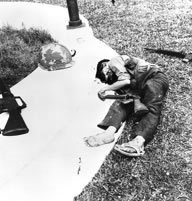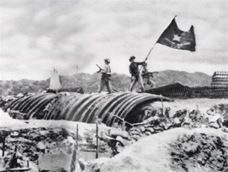The war will soon be over
The first night of Tet had passed Saigon, not yet arrived in San Francisco, did not exist in America; nothing in Saigon occurred in the United States, sometimes nothing occurred in Saigon itself, until it was made news in America. Sometimes nothing in the war happened in San Francisco until after it appeared in Washington DC and been released as news into America, as a nova crushing space and time into never-beenness does not explode until, two billion years later, it appears on this planet as news.
The San Francisco papers were on strike, the newstands vacant for two weeks, Jimmy did not watch TV news, boring, superficial, why bother, so as the explosion of supercharged information flooded through him on its way from Saigon to Washington, crushing the best minds in the U.S. Government as it arrived and bending the fabric of international politics, Jimmy sensed it only as a personal anxiety attack.
The sound his anxiety made was of a woman closing a door: a car door, room door, apartment, house, closet. A door clicks shut; air hisses; solitude flows in.
The message of Jimmy’s anxiety was Anything can happen. You are left to your own devices. And what devices might those be? Something by Leonardo Da Vinci perhaps: “Devyce by wich all perƒonƒ may be rendrd ƒafe from evil of evry kynd.” You have no such device, Jimmy, said his anxiety. Left on your own you are without protection or constraint.
The feeling of Jimmy’s anxiety was the leaking of his Self through his pores.
The desire Jimmy’s anxiety produced was for envelopment in a woman, to be washed in her sweat and bosomy flesh and saliva and attention, like oil on cracked leather, salve on a burn, the essential oils and sealants two people ooze who thrust all that protrudes into all that recedes.
Even leftists need advice from the Great Beyond. Since the information pulsing through him from Saigon to Washington was unaccessible, he turned to a more familiar medium. He closed his eyes, stepped to Krup’s translucent bookshelves, slid back the glass panels, felt for a volume, opened it at random, placed his finger on the page, opened his eyes, read:
Colonialism is not a thinking machine nor a body endowed with reasoning faculties. It is violence in its natural state, and it will only yield when confronted with greater violence.
Sometimes the Great Beyond just wants to fuck with your mind. He reshelved Wretched of the Earth and guided by his pulsing cock, spied a row of volumes on the bottom shelf. There is a color and texture of gray existing nowhere in nature but in the covers of certain hardcore pornographic paperbacks, lurid in the plainness of simple line-drawn covers that communicate the totality of the book before the reader opens it. The book that leaped to Jimmy’s hand was Strapping Girls. On the cover was a girl, indeed strapping, strapped to a chair, whose protruding, robust, delicate buttocks were being strapped by an androgynous hand holding a strap. Say no more. Her open mouth, her wide eyes expressed whatever the reader wanted them to express: delight, pain, terror, remorse, spiritual fulfillment, any, all, more.
The upshot of Strapping Girls sent Jimmy, graced by sin and freed from anxiety, to the Savoy Tivoli Bar & Grill for late afternoon wine. The girl at the greenveined marble table to his left had a heartbraking resemblance to Lucy, the heroine of Strapping Girls, who learned to give as smartly as she took. To think of the girl at the next table as being Lucy however, was, Jimmy understood, a philosophical category mistake, the confusing of ‘pure possibility’ with ‘actual existence,’ in this case fictional persons with real ones. Not to mention that acting upon that category mistake was likely to get Jimmy in such trouble he’d wish he’d turned himself in to the cops. He looked away. To his right, a tourist was reading an out-of-town newspaper:
VIET CONG ATTACK SAIGON
U.S. Embassy Under Siege
Lester Krup’s TV set, a 12-inch black and white Magnavox, hummed to flicker, flickered to the Huntley-Brinkley Report, Snipers are in the U.S. Embassy and on rooftops near the Embassy and are firing on American personnel inside the Compound. No pictures but a tense Chet Huntley, astonished, reading from paper torn from a teletype.
“I want pictures,” Jimmy yelled at the TV.
Pictures. White walls in diamond shapes. White concrete circles on a lawn. A crouching journalist in a panic-white shirt. A lawn, a wall. Jimmy crouched on the floor of Lester Krup’s living room. There must be a cameraman crouching as close to the journalist as I am to the image of the journalist. The film is 24 hours old. The corpse half-hidden by what the journalists call a “planter,” is 24 hours dead. Day-old automatic rifle fire rattles against the planters behind the journalist, who could also now be dead. The Americans, very American, run holding their helmets on their young heads with one hand, their M-16s in the other. They run toward and away from buildings in the compound. The dead are Vietnamese and they are still dead.
Pictures. The television set becomes an animated mural of dread. A beefy unknown American man— a car salesman, CIA operative, football coach — white-shirted like the journalist but dirty, bare headed, butchcut, is handed an automatic rifle with a wire stock, a simple shooting machine. He thrusts it through a white balustrade, fires the gun, it shakes his arms, he drops down, looks behind him as if shots could come from anywhere. Jimmy never sees his face, only the sweating back of him and his fat ass. He fires the weapon at head level, raises his head, peers, lowers, raises the gun, fires it between the balusters, it shakes his arms.
Pictures. An American in a flakjacket and no helmet hauls a matchstick corpse from behind a concrete planter. Jimmy expects the arm by which the body is pulled to come off like an overcooked chickenwing. The body’s ligaments have melted, it follows the arm because it must, a bloody doll in shorts. Something happens. The American drops the doll and disappears. The man, Vietnamese, seems in his 30s. He has been dead now 24, 36 hours San Francisco time, dead forever as far as the dead man is concerned. The fighting still goes on.
Jimmy does not see American dead. They are mentioned. “I lost six men out here,” says a Marine MP. “This is too messed up.” The Vietnamese dead do not look like warriors or even soldiers. They wear shorts. They lie in whatever positions the Americans leave them. The insides of their heads and chests are open for viewing.
Jimmy wonders how big the compound is. An acre? Two acres? Less than the land around the Civil War house outside St. Louis where he grew up. He sees his home, where his mother and father live, as painted by Thomas Hart Benton, the hills rise musclebound behind it, trees robust as fists, plowed land in violent upheaval, flowers in aggressive bloom. His house is under attack, the cup of green sward around it chopped by machinegun fire, the dreaming creek roiled with tanks, halftracks. He huddles in the ancient basement with his parents. Five hundred thousand soldiers, and they can no longer defend their fucking house. They’re losing.
Who are you? Jimmy questions the dead. No one on TV knows. The newscasters are stupified, as if the war had broken into their studios and fired on them. Information has become melee. Jack Perkins in a stippled shower of signals from NBC’s Tokyo offices says ‘232 U.S. soldiers have been killed 600 wounded in Vietnam this week, the worst week of the war, and that’s only in two days.’ Chet Huntley asks him is this some kind of psychological Dien Bien Phu? Perkins replies that the Viet Cong will not capture Saigon because they cannot. It just can’t be done, that’s all, he says. Conclusions about Vietnam, Jimmy thinks, will from now on be derived a priori. What is a psychological Dien Bien Phu? Was Dien Bien Phu itself a psychological Dien Bien Phu? Was it a physical Dien Bien Phu AND a psychological Dien Bien Phu or merely physical and if the effect is the same, how do you tell them apart? Chet?
The soldiers on the Embassy grounds two days ago are images on a screen today, the dead ones are presumeably still dead and the live ones are thus either now live or dead depending on the trajectory of bullets already fired in Saigon but not yet in the United States. Jimmy hears there were 17 or 18 or 19 Vietnamese attackers, that they did not enter the actual Embassy building and that that makes a BIG difference to the Americans.
Three of the dead Vietnamese are Embassy employees either killed by Viet Cong because they were Embassy employees or by Americans who can’t tell the difference between armed enemies and unarmed friends and rely on God to sort them out. One of the Vietnamese dead is reported to be a long-time Embassy employee said to have been found with an AK-47 near him, a Browning automatic pistol in his belt, a thick roll of piastres in his rear pocket. This is a mystery the journalists and newsmen cannot clear up as they cannot clear up the mystery of how the VC just overran every major city in South Vietnam.
General William Childs Westmoreland, Military Assistance Command, Vietnam (MACV) commander, licks his lower lip on NBC. Behind him are the faces of a helmeted soldier and a man of militarized civilian character with shortest hair.
General William Westmoreland speaks carefully into the camera on CBS. The enemy very deceitfully violated the Truce in order to create. He pauses. Jimmy can see him framing words in his mind. maximum consternation in South Vietnam.
A weighty explosion goes off behind General Westmoreland on ABC. The men in the camera frame jerk toward the sound. They don’t duck but they display maximum consternation. Westmoreland rubs his lower lip with his tongue. He turns back to the camera. That’s EOD setting off duds I believe. A smile flickers out from his face like a tongue and is swallowed. His South Carolingian voice wavers on each word. He is framed by rows of stars on his cap and his collar.
Pictures. MPs are trapped in a walled alley of some sort. Firing comes from everywhere. An American leg dangles without life from an armored personnel carrier. The newsmen do not know what the footage is of. The next morning, the station repeats the footage. Jimmy learns the alley is behind General Westmoreland’s command center at Tan Son Nhut airbase. That is not true either, he learns that afternoon, it is behind the U.S. officers’ quarters, which is/was/shall be/continues to be/ under attack. Maximum consternation is what you feel in the moment you enter death. Maximum consternation is the knowledge that what you see — window ledge, apple tree, lover’s face, murderer’s eyes, smoke, the corner of a white balustrade, the executioner’s hand — is your last visual in life.
Who are you, brothers? asks Jimmy. Do you come from the neighborhood? Did you live around the corner from the Embassy, drive a pedicab, fix cars? Are you from a village nearby, a rice farmer’s son? Did you walk the length of the nonexistant Ho Chi Minh Trail to show up on this day? Jimmy is so American he fears if their names are not recorded in the U.S. press they never will have lived.
Yet surely, because they lived, the war will soon be over.
 Tet on TV
Tet on TV
